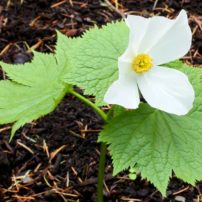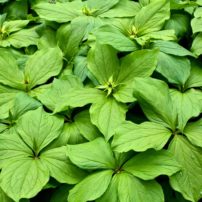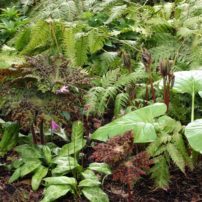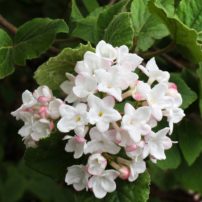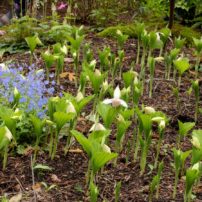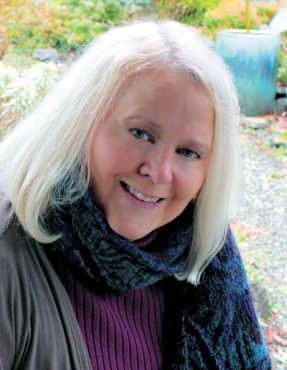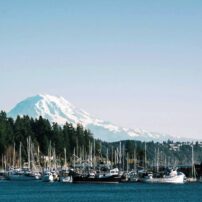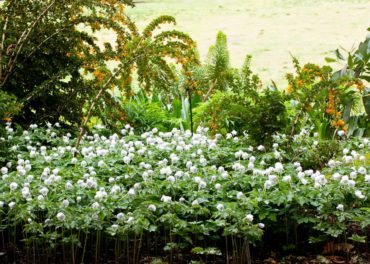
Recently, a group led on a private Heronswood tour by Dan Hinkley, one of the founders, learned a brief history of the garden.
You can never go back to the same place and have it be the same. Even though the story of the land that is now called Heronswood appears to have gone full circle back to its original landowners, the Port Gamble S’Klallam Tribe. The journey of the garden reads more like an ever-winding spiral.
As the spiral leads upward to a better place, the journey has had a fair share of ups and downs. Heronswood began back in 1987 when Hinkley and Robert Jones purchased 5 acres in Kingston. When an adjoining 2.5 acres went on the market, the pair purchased it too. That new parcel became the heart of the nursery where the greenhouses perched.
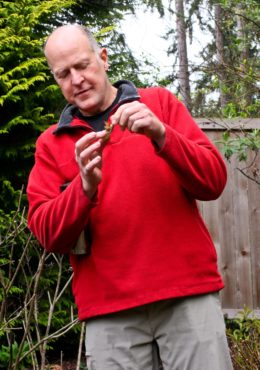
“One of our first goals was to tear down the trailer,” Hinkley said to the group. After a noticeable pause, everyone laughed. Behind him, a dark, green trailer filled the background.
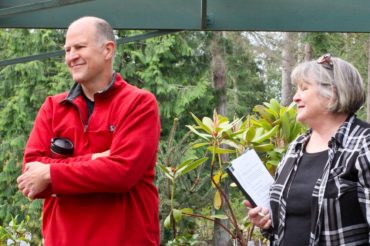
“There it still is,” he said, looking back at the trailer. “I am going to live long enough to have that trailer torn down. We could auction it off today.” More laughter ensued.
The tour group walked through the early spring garden and stopped many times along the way as Hinkley sprinkled in stories about the collection, or how a unique flower is pollinated. His humor delighted and captivated the entire group.
Each private tour is different from the other seasons. April’s garden is filled with ephemeral plants that go dormant during the heat of summer. Summer brings mature foliage and exuberant flowers in July. September’s tour has plenty of outstanding foliage and blossoms that end the growing season with the last hurrah.
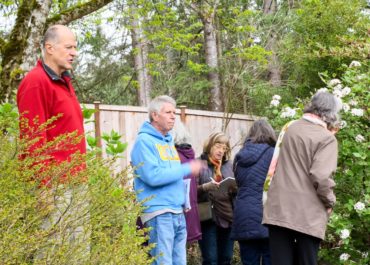
The Heronswood garden developed in concert with the nursery, when Hinkley began traveling around the world, looking at plants in the wild and collecting seeds. The garden became a showcase for many of the plants he brought back from his trips over the years. The garden and nursery grew along with its fame. During its heyday, Heronswood Nursery — renowned for rare and unusual plants — shipped them around the country, Japan and Europe.
In the year 2000, the W. Atlee Burpee Co. bought Heronswood. Six years later, the corporation closed the operation down, dismantled the greenhouses and moved a lot of plant material to its base of operation in Pennsylvania. Eventually, the company put the property up for sale.
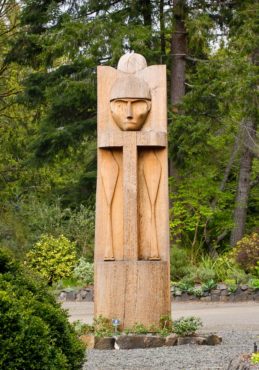
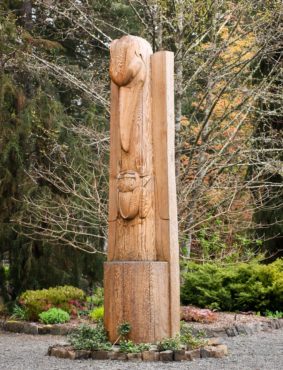 In 2012, the land sale gave the Port Gamble S’Klallam Tribe the opportunity to buy back some of its ancestral lands. At the time of the purchase, the tribe did not know what it would do with the entire 15-acre property, yet made a commitment to maintaining the gardens.
In 2012, the land sale gave the Port Gamble S’Klallam Tribe the opportunity to buy back some of its ancestral lands. At the time of the purchase, the tribe did not know what it would do with the entire 15-acre property, yet made a commitment to maintaining the gardens.
Hinkley came back as a volunteer that same year and with a team of other volunteers, began work to bring the garden back to life. Two years later, the tribe asked Hinkley to take on the role of part-time director. After two years, the tribe offered him full-time work.
The garden is now maintained by staff and crew, and devoted volunteers who work under Hinkley’s direction.
“I have a fantastic staff,” Hinkley said. “One half of my staff are Port Gamble S’Klallam members. It’s an incredible melding spot for two distinct cultures.
“I lived here for nearly 25 years — Robert and I did — and never interacted with the Port Gamble that was a mile away. We were really disparate communities, and here a garden brings us together.”
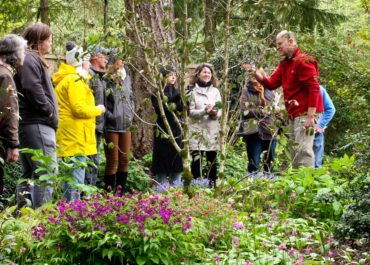 Hinkley said it’s been rewarding to bring the two cultures together and learn from one another.
Hinkley said it’s been rewarding to bring the two cultures together and learn from one another.
“That has really been an extraordinary opportunity. Some tribal members volunteer in the garden, but many are employees,” he said. “The volunteer base is important to us, but it’s not on a day-to-day basis. We have two volunteer days per month — the second Wednesday and fourth Saturday of each month. Volunteers also come and help during special events.”
Hinkley continues to do the work he has done for the last 35 years. There has never been an interruption in his pursuit of collecting plants from around the world. There was just an interruption at Heronswood, where the collections had always been planted until it was shut down for many years. Hinkley switched to growing his collections at his Windcliff garden in Indianola.
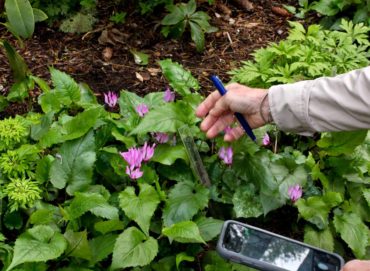
He had a large backlog of plants that he says continues to this day. He travels for at least two to three plant collection trips every year. After the tour, Hinkley left to spend three weeks in China. He planned to look at spring woodland plants and collect some during that time, since many go dormant later in the season and cannot be found.
Hinkley also works as a consultant for Monrovia. As he put it, “We have a great relationship, because it really is fantastic for Heronswood, in that all of my excess collections, they (Monrovia) propagate for me.”
The collections are then planted at Heronswood.
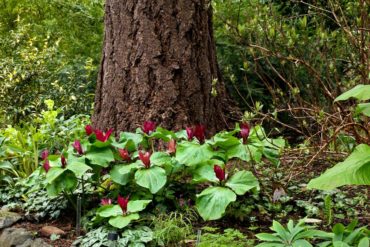
“It’s a win-win for everybody,” he said.
The purpose now is not in resurrecting what once was Heronswood, although many elements there are the same.
“We have no intentions in re-creating Heronswood as some sort of a memorial,” Hinkley said.
The plan is to make the garden a new and refreshing place for everyone to visit.
“We are making a new garden to celebrate the new ownership of the S’Klallams,” he said.
Although the legacy of Heronswood lives on, as Hinkley notes, “it’s a good mingling of goals.”



